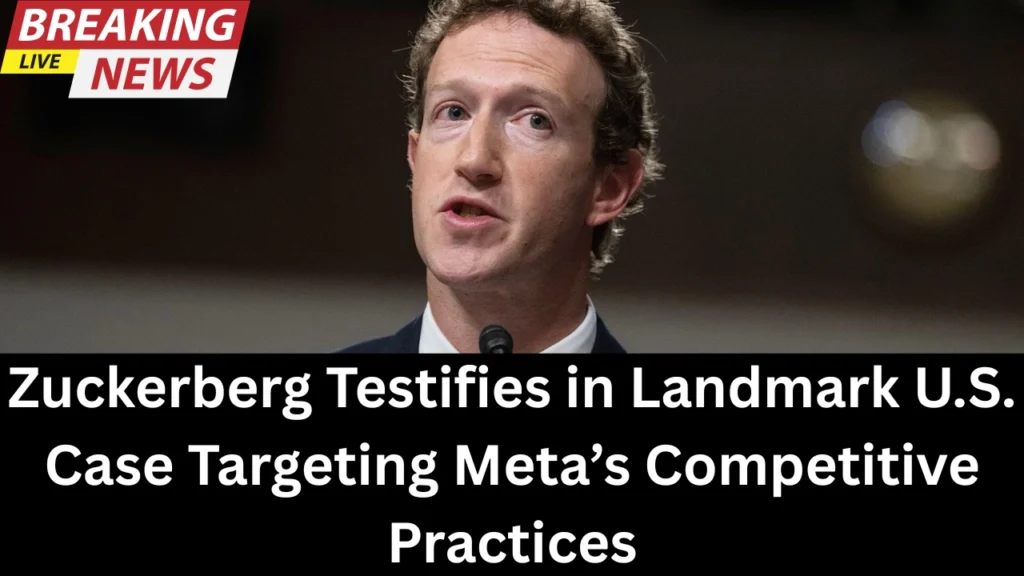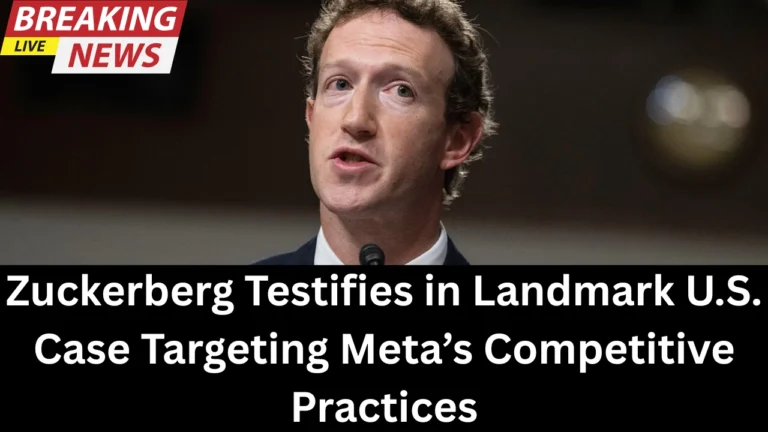In a pivotal moment for Big Tech, Meta CEO Mark Zuckerberg took the witness stand on Monday in a landmark U.S. antitrust trial that could reshape the future of the digital economy. The case, brought by the Federal Trade Commission (FTC), accuses Meta — formerly Facebook — of illegally stifling competition by acquiring emerging rivals Instagram and WhatsApp, rather than allowing them to challenge the company’s dominance in the social networking space.

The trial, taking place in a federal courtroom in Washington, D.C., is expected to last at least eight weeks, with sweeping implications for how the government regulates monopolistic behavior in tech.
Meta Platforms, Facebook’s parent company, is on trial accused of attempting to eliminate competitors and maintain monopolistic control of the social media industry through its purchases of Instagram and WhatsApp https://t.co/S24qwf7g3E
— The Times and The Sunday Times (@thetimes) April 14, 2025
FTC’s Core Allegation: Buying, Not Competing
The FTC contends that Facebook, under Zuckerberg’s leadership, chose to “buy out” its rivals rather than compete with them. These acquisitions, it argues, were part of a strategic pattern to preserve Facebook’s monopoly and stifle innovation in the digital communications market.
In his opening remarks, FTC attorney Daniel Matheson stated:
“They decided that competition is too hard and it would be easier to buy out their rivals than to compete with them.”
The 2012 Instagram acquisition for $1 billion and the 2014 WhatsApp deal worth $19 billion are central to the case. Both companies have since become global digital giants, boasting over 2 billion users each.
Emails Under Scrutiny
The FTC presented internal emails showing early concerns within Facebook leadership about Instagram’s potential to emerge as a major competitor. One 2011 email warned that Instagram was gaining rapid traction among smartphone users and could threaten Facebook’s core offerings.
Another 2012 exchange revealed discussions about buying Instagram and leaving it largely unchanged while Facebook built its own photo-sharing features. This would, the email suggested, avoid upsetting users and make it easier to outflank Instagram long-term.
On the stand, Zuckerberg downplayed these messages, characterizing them as early-stage brainstorming before any concrete acquisition plans were set.
“Those emails were part of broader conversations and speculation, not final strategy,” Zuckerberg said under cross-examination.
Meta’s Defense: Growth Through Investment
Meta’s legal team, led by attorney Mark Hansen, rejected the government’s interpretation of the acquisitions. Hansen argued that U.S. antitrust law does not prohibit buying companies to improve them, and that Meta’s ownership helped scale and improve Instagram and WhatsApp for billions of users worldwide.
“Acquisitions to improve and grow an acquired firm are not unlawful in the United States. That is what Facebook did,” Hansen asserted.
The defense also noted that Meta’s services are free to users and face intense competition from platforms like TikTok, YouTube, Snapchat, iMessage, and X (formerly Twitter).
Playing Politics: Trump’s Role in the Background
The case was originally filed by the FTC in December 2020, under then-President Donald Trump. Observers had speculated whether Trump’s return to the political spotlight would lead to a withdrawal or softening of the case.
Instead, the lawsuit has gained momentum. Reports indicate that Zuckerberg made several efforts to influence the administration, including multiple visits to the White House, contributing to Trump’s inauguration fund, and even purchasing a $23 million mansion in Washington, D.C., allegedly to stay closer to political power.
Despite this lobbying, the FTC has proceeded aggressively, escalating its broader crackdown on Big Tech.
Government Action Against Elite Universities and Tech Firms
The Meta trial is part of a larger wave of federal enforcement actions against powerful institutions. The Trump administration recently revoked $400 million in funding to Columbia University and suspended grants to other elite schools. In tech, it has focused on Apple, Amazon, and Google over competitive practices, while Meta is now in the most prominent legal spotlight.
The Market Definition Battle
One of the most hotly contested issues in the trial is how the relevant market is defined. The FTC claims Meta controls a dominant position in the market for “personal social networking” apps people use primarily to connect with friends and family.
This excludes platforms like TikTok, YouTube, or X, which the FTC argues serve different functions, such as short-form entertainment or broadcasting.
Meta, however, is fighting back hard against this definition. A company spokesperson stated:
“The evidence at trial will show what every 17-year-old in the world knows: Instagram, Facebook and WhatsApp compete with Chinese-owned TikTok, YouTube, X, iMessage and many others.”
The broader Meta can define the market, the less likely it is that the FTC can prove monopoly behavior — a classic strategy in antitrust litigation.
Key Witnesses to Testify
Besides Zuckerberg, the trial will feature testimony from several key figures, including:
- Former Meta COO Sheryl Sandberg
- Executives from rival firms like Snapchat and Signal
- Industry experts on competition, digital markets, and consumer privacy
Each is expected to provide insight into Meta’s internal culture and competitive tactics — with particular attention to whether Instagram and WhatsApp were neutralized or nurtured post-acquisition.
Meta’s User Experience and Ad Load
One line of FTC argument centers around diminished user experience as proof of monopoly power. The agency claims that Meta, unchallenged by competition, has degraded its services with:
- Excessive ads
- Unwanted product changes
- Invasive tracking practices
These claims aim to demonstrate consumer harm, a necessary element of proving monopoly abuse under U.S. antitrust law.
What’s at Stake?
If the court sides with the FTC, Meta could be forced to divest Instagram and WhatsApp, unraveling two of the most successful acquisitions in Silicon Valley history. Such an outcome would send shockwaves across the tech industry, discouraging future mergers and potentially breaking up other dominant platforms.
On the other hand, if Meta prevails, it may set a high bar for future government efforts to rein in tech giants through retroactive antitrust enforcement.
Conclusion
The trial against Meta marks one of the most consequential antitrust cases in a generation. With Mark Zuckerberg on the stand and government lawyers laying bare a decade of internal strategy, the court’s ruling could define how the U.S. treats consolidation, innovation, and competition in digital markets for years to come.
Whether it results in a historic breakup or another missed opportunity to regulate Big Tech, the case is already a powerful symbol of a shifting regulatory era.

